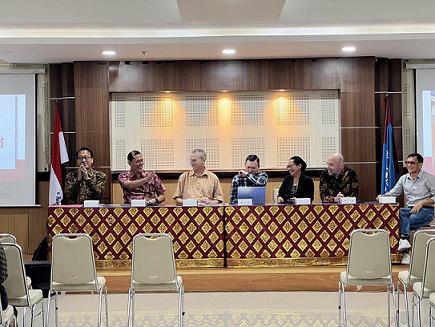Public Lecture of the Political Science Study Program of FISIP UNUD as well as Assessment of Collaborative Relations between FISIP UNUD and ICRS – UGM
On May 10 2023 a collaborative activity was carried out by FISIP UNUD with ICRS - UGM at the FISIP Building, Udayana University. The event went smoothly with a discussion introducing ICRS (Indonesian Consortium for Religious Studies) as an institution that focuses on religious studies in Indonesia. ICRS itself is a combination of three universities, namely Gadjah Mada University (UGM), Sunan Kalijaga State Islamic University (UIN), and Duta Wacana Christian University (UKDW). This activity was also attended by the Dean of FISIP Dr. Drs. I Nengah Punia, M.Si. and Deputy Dean 3 Dr. I Made Anom Wiranata, M.A., S.IP. and from the ICRS, namely Dr. Dicky Sofjan - Core Doctoral Faculty, Dr. Leonard Epafras - Core Doctoral Faculty, Dr. Michael Quinlan - Visiting Lecture, Hendrikus Paulus Kaunang, M.A - Academic Coordinator, Ida Fitri Astuti, M.A - Program Manager and Mr. Les Redfern - Director of IIAP. This collaboration is also expected to strengthen relations between institutions and provide other opportunities for cooperation in the future.
The event then continued with a Public Lecture entitled Religious Literacy. Dr. Dicky Sofjan, as the Core Doctoral Faculty from ICRS, presented very interesting material on the relationship between religious, political and social media literacy. This was later added by ICRS colleagues. This lecture also illustrates that religious literacy is not only interpreted as knowing a particular religious teaching. Nor is it only being able to read certain religious texts-both sacred and profane. Religious literacy is an ability to see and analyze the fundamental connection between religion and social, political and cultural life through various perspectives. "Not studying religion, but learning about religion" was what the students later remembered from the public lecture. Then, dr. Dicky Sofjan added, that sometimes many people still misinterpret this letter. Many people also study religion but do not understand religion itself. This is one of the challenges in this modern era, where it is very easy for people to find out something pragmatically about religion, but forget to see who and what they got. However, Dr. Leo added, “mastery of these religious texts does not guarantee that someone is literate in religion. Religious literacy is not only about the ability to read in the sense of 'spelling' skills of religious texts. However, religious literacy is a combination of the ability to read religious texts, select information and knowledge in these religious texts, see and analyze in a variety of contexts, for further use in one's religious life. Many of the Political Science and Communication Science students were intrigued to question what it means to have religion in the world, especially in Indonesia. Therefore, the goal of the public lecture was achieved in the presentation of material and discussions carried out by the presenters and students of FISIP UNUD.










